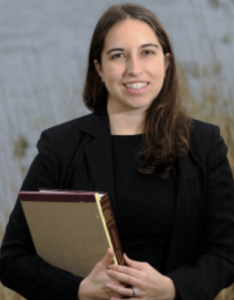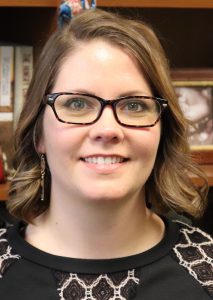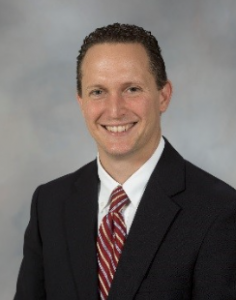 Stephanie Showalter Otts is the director of the National Sea Grant Law Center and the Mississippi-Alabama Sea Grant Legal Program at the University of Mississippi School of Law. Stephanie received a bachelor’s in history from Penn State University and a joint Juris Doctor/master’s in environmental law from Vermont Law School. She is licensed to practice law in Pennsylvania and Mississippi. As director, Stephanie oversees a variety of legal education, research, and outreach activities, including providing legal research services to Sea Grant constituents on ocean and coastal law issues. Her duties also include the supervision of law student research and writing projects and providing assistance to organizations and governmental agencies with interpretation of statutes, regulations, and case law. Stephanie also teaches a foundational course on ocean and coastal law at the University of Mississippi School of Law. Her research on natural resources, marine, and environmental law issues has been published in a variety of publications. Stephanie has conducted extensive research on marine and freshwater invasive species.
Stephanie Showalter Otts is the director of the National Sea Grant Law Center and the Mississippi-Alabama Sea Grant Legal Program at the University of Mississippi School of Law. Stephanie received a bachelor’s in history from Penn State University and a joint Juris Doctor/master’s in environmental law from Vermont Law School. She is licensed to practice law in Pennsylvania and Mississippi. As director, Stephanie oversees a variety of legal education, research, and outreach activities, including providing legal research services to Sea Grant constituents on ocean and coastal law issues. Her duties also include the supervision of law student research and writing projects and providing assistance to organizations and governmental agencies with interpretation of statutes, regulations, and case law. Stephanie also teaches a foundational course on ocean and coastal law at the University of Mississippi School of Law. Her research on natural resources, marine, and environmental law issues has been published in a variety of publications. Stephanie has conducted extensive research on marine and freshwater invasive species.
Amanda Drew
 Amanda Drew’s work emergency services began when she was 16 in the volunteer fire service. In 2013 she earned her bachelor’s in science with a major in fire science from Anna Maria College in Paxton, Mass. — introducing her to the emergency management world. In 2016 she earned her master’s in public administration with a concentration in emergency management also from Anna Maria College. Throughout her undergrad and graduate work, she was a call firefighter, a deputy emergency manager for Rutland, Mass.; a campus police dispatcher and later the supervisor at Assumption College in Worcester, Mass. Prior to coming to Ole Mis, she spent about five months in Baton Rouge, La., with the Federal Emergency Management Agency working on a direct housing mission.
Amanda Drew’s work emergency services began when she was 16 in the volunteer fire service. In 2013 she earned her bachelor’s in science with a major in fire science from Anna Maria College in Paxton, Mass. — introducing her to the emergency management world. In 2016 she earned her master’s in public administration with a concentration in emergency management also from Anna Maria College. Throughout her undergrad and graduate work, she was a call firefighter, a deputy emergency manager for Rutland, Mass.; a campus police dispatcher and later the supervisor at Assumption College in Worcester, Mass. Prior to coming to Ole Mis, she spent about five months in Baton Rouge, La., with the Federal Emergency Management Agency working on a direct housing mission.
Dr. Peter Pendergrass
 Peter W. Pendergrass, MD, MPH, is an associate professor in the department of preventive medicine at the School of Medicine and the School of Population Health at the University of Mississippi Medical Center. He is also the program director for the newly approved preventive medicine residency. He is board certified in public health and general preventive medicine, completing his preventive medicine residency and his master of public health at the Bloomberg School of Public Health at Johns Hopkins University in Baltimore. In addition, Dr. Pendergrass is residency trained in internal medicine and fellowship trained in endocrinology at the University of Oklahoma in Oklahoma City. Dr. Pendergrass graduated from the McGovern School of Medicine at the University of Texas Health Science Center in Houston.
Peter W. Pendergrass, MD, MPH, is an associate professor in the department of preventive medicine at the School of Medicine and the School of Population Health at the University of Mississippi Medical Center. He is also the program director for the newly approved preventive medicine residency. He is board certified in public health and general preventive medicine, completing his preventive medicine residency and his master of public health at the Bloomberg School of Public Health at Johns Hopkins University in Baltimore. In addition, Dr. Pendergrass is residency trained in internal medicine and fellowship trained in endocrinology at the University of Oklahoma in Oklahoma City. Dr. Pendergrass graduated from the McGovern School of Medicine at the University of Texas Health Science Center in Houston.
Prior to joining UMMC on January 30, 2017, Dr. Pendergrass served as the regional medical director for Region 1 at the Texas Department of State Health Services. In this capacity, he oversaw all state level public health services for a 41 county area in West Texas – serving as the local health authority for 35 counties. These services included the provision of immunizations and the treatment of sexually transmitted diseases and tuberculosis, epidemiological investigations, dental health services, public health preparedness activities, social work services, and zoonotic investigations and treatments. Dr. Pendergrass is Federal Emergency Management Agency trained in IS-0700, ICS-100, ICS-200, and ICS-300. He has completed positions specific training for the incident commander roll, planning chief roll and operations chief roll. He is trained in establishing and managing a Point of Dispensing operations. Dr. Pendergrass has also received Mass Fatality Management Training. During his tenure at Texas DSHS, he assisted in planning for H1N1 and Ebola responses as well as responded to local, regional, and state level events.
Previous experiences include serving as bureau chief for the Communicable Disease Division of the Texas Department of Health in Austin, Texas, and as the coordinator of Family and Personal Health Services for the San Antonio Metropolitan Health District in San Antonio, Texas. In addition, he has practice population-based medical quality improvement work at the state and federal levels.
Anne Cafer
 Anne M. Cafer is an assistant professor of sociology at the University of Mississippi. She also serves as coordinator for the Community Based Research Collaborative housed within the UM Center for Population Studies, of which she is an affiliated researcher. She holds a bachelor’s of science in both molecular biology and sociology, a master’s in anthropology and a Ph.D. in rural sociology.
Anne M. Cafer is an assistant professor of sociology at the University of Mississippi. She also serves as coordinator for the Community Based Research Collaborative housed within the UM Center for Population Studies, of which she is an affiliated researcher. She holds a bachelor’s of science in both molecular biology and sociology, a master’s in anthropology and a Ph.D. in rural sociology.
Her research uses a systems approach to examine community resilience and social change around food procurement, agricultural systems, environmental sustainability and health/nutrition at the community level. She works primarily in Sub-Saharan Africa and the Mississippi Delta. She also has an interest in the scholarship of teaching, specifically the impacts of community-engaged learning on both community and student outcomes. Her advanced courses are community-based, participatory research courses where students are actively involved with community stakeholders to explore collaborative solutions to non-resilient systems.
Cafer is a former Borlaug Scholar in Global Food Security, a member of the prestigious Rollins Society at the University of Missouri and has worked as a consultant with groups such as Land O’Lakes International Development and the Association of Public and Land-grant Universities. She also edits Community Development Practice, a publication of the Community Development Society that presents innovative approaches, tools and techniques that can be readily applied by community development practitioners and applied researchers.
Dr. Josh Mann
 Dr. Mann completed his undergraduate degree at Delta State University in 1982, and his doctor of medicine degree at the University of Mississippi Medical Center in 1996. He then completed a transitional year at Carraway Methodist Medical Center in Birmingham, Alabama, followed by a residency in public health and general preventive medicine at the University of South Carolina School of Medicine, with a master of public health degree from the University of South Carolina’s Arnold School of Public Health.
Dr. Mann completed his undergraduate degree at Delta State University in 1982, and his doctor of medicine degree at the University of Mississippi Medical Center in 1996. He then completed a transitional year at Carraway Methodist Medical Center in Birmingham, Alabama, followed by a residency in public health and general preventive medicine at the University of South Carolina School of Medicine, with a master of public health degree from the University of South Carolina’s Arnold School of Public Health.
He served for three years as research director for the Medical Institute for Sexual Health in Austin, Texas, then joined the faculty at the University of South Carolina School of Medicine in 2002 where he served as medical director of Employee and Student Health until June 2015. There, he served as Preventive Medicine residency director from August 2005 to June 2015. In that capacity, he led the work group that created Accreditation Council for Graduate Medical Education-required milestones for Public Health and General Preventive Medicine residents.
Dr. Mann also has made a substantial contribution as a researcher, having been principal investigator or co-investigator on a number of research and other grants. He has authored or co-authored 75 peer-reviewed articles, more than 25 as first author. His research interests include the health of people with disabilities, prenatal risk factors for childhood disabilities, epidemiology of mental health, and links between religion/spirituality and health. Dr. Mann joined the University of Mississippi Medical Center’s faculty in July 2015 as professor and chair of the Department of Preventive Medicine.